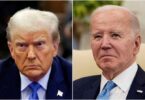BEIJING (AFP): China is set to mark 30 years since the deadly Tiananmen crackdown with a wall of silence on Tuesday after arresting activists and tightening internet censorship ahead of the politically sensitive anniversary.
It has become a grim, annual tradition for authorities to round up activists ahead of the June 4 anniversary as they seek to suppress reminders of the 1989 Tiananmen Square pro-democracy demonstrations — a strictly taboo topic.
A number of activists have been detained or “disappeared” again this year, and many popular livestreaming services are scheduled to be down around the anniversary for “technical” reasons.
China’s ruling Communist Party has suppressed any discussion of the Tiananmen crackdown over the years. Its “Great Firewall of China” army of online censors regularly erases any articles, memes, hashtags or photos alluding to the protest.
But there have been two, rare public acknowledgements in the lead-up to June 4 this year.
First, China’s defence minister on Sunday defended the crackdown, describing it as the “correct” policy and even suggesting it helped the country’s economic rise over the last 30 years.
“That incident was a political turbulence and the central government took measures to stop the turbulence,” General Wei Fenghe said at a regional security forum in Singapore.
The nationalistic state-run tabloid Global Times hailed the Chinese government’s handling of Tiananmen and its aftermath as “a political success”.
“As a vaccination for… Chinese society, the Tiananmen incident will greatly increase China’s immunity against any major political turmoil in the future,” it said in an editorial published Monday in its English-language edition.
US Secretary of State Mike Pompeo sharply disagreed on how China has evolved as he hailed the “heroic protest movement” in a statement for the anniversary.
“Over the decades that followed, the United States hoped that China’s integration into the international system would lead to a more open, tolerant society. Those hopes have been dashed,” Pompeo said amid a tense US-China showdown on trade.
Pompeo denounced the “new wave of abuses” by China, including the mass incarceration of Uighur Muslims, and urged a full account of what happened 30 years ago.
- Complete purge –
Tight security was already in force on Monday, with authorities preventing journalists from filming, taking photographs, or even entering the square in the centre of Beijing.
One AFP journalist was stopped and told to delete images from a camera, and warned not to do it again without permission from authorities.
In spring 1989, students and workers gathered at Tiananmen Square — the symbolic heart of Chinese power — demanding democratic change and an end to corruption, inspiring protests across the country.
After seven weeks of demonstrations, the government deployed tanks and soldiers who chased and killed demonstrators and onlookers in the streets leading to the square on June 4.
Hundreds — possibly more than 1,000 — were killed.
Authorities have still not said what really happened or how many were killed that day.
Talking privately with family and friends about Tiananmen is still possible, but any commemoration in public risks almost certain arrest.
In the run-up to the 30th anniversary, popular livestreaming sites Huya and YY announced they would temporarily shut down livestreams for “technical updates” until June 6 and 7 respectively.
Nasdaq-listed Bilibili, a video-streaming platform popular among young anime, comic and gaming fans in China, has blocked live commentary on its videos from May 29 until June 6.
Virtual private networks (VPN) — software allowing users to jump the Great Firewall — have been disrupted.
All language versions of Wikipedia — whose pages include details about the Tiananmen crackdown — were blocked from the Chinese internet weeks ago.
- Tuned out –
Among the string of activists detained or “disappeared” are six artists who had put up a painting and performance art exhibition titled “A Conscience Movement” in the eastern city of Nanjing.
Separately, folk singer Li Zhi, who had written and performed songs about the Tiananmen crackdown, was reportedly missing, with his songs and accounts on Chinese social media no longer available.
The complete purge of the Tiananmen Square crackdown has been crucial to the Chinese government’s bid to curb dissent over the years.
The deadly repression of 1989 contradicts propaganda that portrays the military as a “benevolent force” — another reason to hide it from the public, said Jeffrey Wasserstrom, a history professor at the University of California, Irvine.
“It’s very hard to explain away those tanks and the soldiers turning against the people,” he said. “1989 was a clear moment when there was a divide” between the army and the people.






